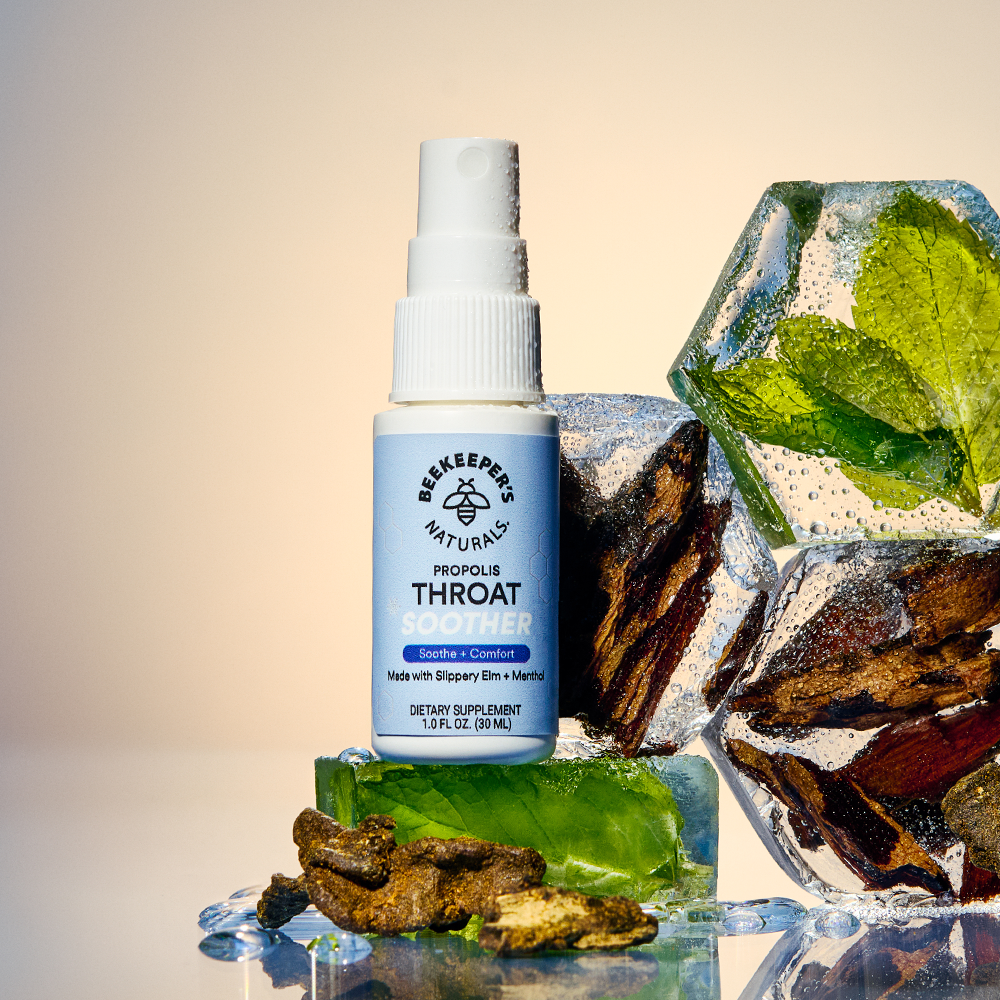In the latest issue of our Unveiled series, where we learn about the beekeeper behind their veil, we met up with Emily Bondor, the owner of Santa Cruz Bee Company. We picked Emily’s brain to find out what drew her to beekeeping, and why she’s still doing it. She's sharing what makes beekeeping fun, difficult, and rewarding. Read on to hear about her craziest hive rescue, her thoughts on sustainable beekeeping, and much more! How long have you been a beekeeper? What inspired you to start?



 Emily Bondor is the owner of Santa Cruz Bee Company. She also keeps bees for Rob Keller of Napa Valley Bee Company. Follow Emily on Instagram @fuzzy_bee_love and check out her website at www.scbee.co.
Emily Bondor is the owner of Santa Cruz Bee Company. She also keeps bees for Rob Keller of Napa Valley Bee Company. Follow Emily on Instagram @fuzzy_bee_love and check out her website at www.scbee.co.
"I have been keeping bees for two years. I was interning on a farm in Maui--we had beehives and a local beekeeper who taught us some of the basics. The lingo is what got me hooked. I remember thinking, “what on earth was a super? and a brood chamber?” I also knew how vital bees were to crop pollination and thought that it would be a good niche agricultural direction to go in. I began working for the Maui Queen Bee Company and dove head first into more advanced beekeeping methodologies. The rest is history."
What was your greatest fear about starting to keep bees?
"Probably stings-as cliché as it sounds. My grandmother is severely allergic, so when I was young, I learned to fear our fuzzy little friends. However, once I started getting stung more and more, my physical reaction diminished, and now I usually work bees in only a veil, if that."
Tell us three lessons that you’ve learned from the bees.
"The first would be patience; I often struggle with waiting, but bees are slow and methodical and beekeeping requires you to slow down, too. The second lesson would be harmony; with all the challenges honeybees face today, we can see their delicate biology as a “canary in the coal mine” for the disequilibrium between human beings and the natural world. The third lesson would be faith; my philosophy on beekeeping is that we need to help bees, not exploit them. Running a successful business is based in economic growth, but beekeepers need to first consider the ecological impacts of their business. Beekeepers can have a big impact on honeybees and many standard and widely accepted management practices interfere with the species Apis Mellifera. We must remember that the bees don’t work for us, but rather we work for the bees."

How has working closely with bees changed your perception of nature or the world around us?
"I believe I was already aware of the delicate interactions existing in nature before becoming a beekeeper, but now I am even more acutely aware of what lies in the balance. Particularly keeping bees in California, where we’ve had a drought for several years now, I see how no rain means no forage which often means starving bees (in rural areas) unless you supplementally feed them. This is far from natural, and some argue this gets in the way of natural selection and can be detrimental to honeybees in the long term. People are divided on issues the world over--beekeeping is just a microcosm of dissenting opinions."
What’s your favourite thing about being a beekeeper?
"Ooh, that is so hard to say! I think it is the good vibrations-- hum of bees at work. When I open a hive, I really get into my flow. The slow and intentional manipulations required while handling honeybees keeps me very focused on what I am doing. That hum has become my happy place and where I find great joy."
What is the most difficult thing about being a beekeeper?
"There are several difficult things about keeping bees. For one, bees mate openly, and queen bees can fly up to nine miles on their mating flight. So, unless you know there are no other beekeepers in an 18-mile radius, you cannot be sure you’re in control of that genetic line. Furthermore, worker bees can forage far and wide, so your bees are likely exposed to pesticides that you’re not aware of. The weather is a factor, as rain can prevent mating flights, but drought can greatly diminish nectar flows. Industrial agriculture and monocropping has greatly decreased wild bee habitat and honeybee forage. The list goes on and on. One thing to remember is that for every action there is an equal (and opposite) reaction. Beekeeping is highly dependent on the environment but also on the management practices of other beekeepers in your area. My mentor always says, and I aim to reflect, is that 'they’re not your bees, they’re not my bees, they’re our bees'."
Tell us about your craziest bee removal/most unique place you rescued bees.
"We got a call from some tree removal guys who were cutting down a giant redwood with a colony of bees in it. Rather than fell the whole tree and break the hive apart, we had them carefully cut around the nest, rope it up, and then use a winch to slowly lower down the rounds containing the honeybee colony. We love to do these kinds of rescues, because it helps to preserve wild genetic survivor stock, and also because it makes for a great “conversation hive” in the apiary!"

What time of year do you rescue the most swarms? Why?
"We catch the most swarms in the spring and summer, as that is when the bees are most active and there are usually the biggest nectar flows. Colony growth is directly correlated to available forage and nectar flows, and when a colony is short on space it will swarm. If you see a very late swarm (like in winter) it could actually be a small colony of bees that is absconding from the hive due to disease or pests. You can catch these bees as you would a swarm, but it’s likely they’re already doomed and won’t survive without significant artificial support."
What is your favourite bee product and why?
"Wow, hard to say. I think honey, because I have always had a sweet tooth, and because it can be so varied in flavor, texture, color. But, I also love the taste of pollen, and propolis saves me when I have a sore throat. So, maybe it’s a tie between all three..."
Do you use any bee products for health purposes?
"Much like the Beekeeper's Naturals product, I also make a throat spray with a propolis tincture that is great to use when I have a sore throat. I sometimes to use honey to wash my face, and I make and sell salves and body scrubs that contain honey and beeswax as well. And of course I can’t live without a good beeswax lip balm!"
For those out there who fear the bees, what words of advice do you have to clear up this misconception?
"Bees are not out to get you. The chances that you will get stung by a bee that is out foraging or bringing food back to its hive are extremely slim. Honeybees die when they sting you, so unless you’re in the hive manipulating their brood (making them feel defensive or threatened) they have no interest in stinging you. Honeybees are our friends! Swarming bees have no brood to protect, so they usually will not sting you."
What do you have to say to vegans who don't believe in using bee products?
"We openly believe that supporting ethical and sustainable beekeepers is an important part of helping the bees and generating awareness."
How do you respond to people who question the practices of taking and consuming bee products?
"To each his own, really. I do not find consuming bee products to be unethical, as long as you are not exploiting the bees and you’re leaving them the majority of their food stores. I think honey, propolis and wax are more ethical to harvest than pollen and royal jelly. The way the former are harvested is usually less invasive and can be done without depriving the bees right off the bat. The latter, to me, tend to seem a bit cruel so I generally don’t condone them."
What sustainable practices do you incorporate into your beekeeping?
"As many as there are... The most salient one I would say is that I am treatment free, meaning I don’t use any chemicals, miticides or antibiotics in the hive. I only source bees locally and focus on locally adapted survivor stock. I practice foundationless beekeeping as I mentioned before, and I also do not participate in migratory beekeeping, but rather put my focus on growing a perennial, drought tolerant habitat and food source in my apiaries so that honeybees and native pollinators can thrive."
What does sustainable beekeeping mean to you?
"To me, sustainable beekeeping means thinking about the bigger picture. If we take an approach that is smaller scale, more holistic and more regenerative, we can move from a purely economic and exploitive model of beekeeping to one that is more in line with all of ecology. We need to focus on habitat preservation and growth to ensure biodiversity in our pollinators. Honeybees will survive—it’s native, solitary bees that really need to be protected and 'saved'."
What are your thoughts on treating bees with antibiotics? Will you ever do it?
"No. I believe that treatments of any kind are a part of the problem, not a part of the solution. They only address the symptom and not the root cause and are far from natural. I do not have any experience with natural treatments or probiotics, but am somewhat more open to natural treatments than chemical ones."
How do you feel about the practice of feeding bees? Do you view this negatively? If so, what are the best alternatives?
"I don’t enjoy feeding bees, as it unnaturally supports them and can also be seen as sustaining weak genetics. Sugar water is bee junk food; empty calories with no nutrition. I haven’t done much research, but I’ve also heard that feeding bees sugar water can affect their honey-processing enzymes over time. I learned a biodynamic recipe from Rob Keller of Napa Valley Beeco that he calls “Rudy Juice” after Rudolph Steiner. It is sugar water that also contains comfrey, camomile and a pinch of salt. I also learned in a class taught by Michael Bush that sugar water has a lower pH that most nectar so it helps the bees if you add a small amount of citric acid to the sugar solution. Best case scenario, you don’t have to feed your bees. However, if the drought means no natural forage then sometimes feeding is the best option to prevent massive colony losses."

Do you feel that people in your country are fairly conscious of the bees and their importance? We have many wonderful and passionate bee advocates but a large portion of the population is still unaware of all that the bees do for the earth. How is this looked at in your area or country?
"I do feel that people are and continue to become aware of the problems facing our honeybee and native bee populations. However, I think people are going about it in the wrong way. Everyone thinks that in order to “save the bees”, they need to become a beekeeper themselves. If people really want to help the bees, go plant some good bee forage like sweet clover and borage."
As a beekeeper, I’m sure that you’ve heard of Colony Collapse Disorder. In North America we have experienced serious issues with CCD over the last decade. How has CCD affected you?
"As a favourite beekeeper of mine likes to say, “it isn’t Colony Collapse Disorder, it’s People Collapse Disorder”. What he means to say by this, is that we have essentially engineered this problem. Through massive habitat loss, monocropping, the extensive use of pesticides (many of which affect plants systemically and are synergistically very lethal) and by chemically treating honeybees with miticides and antibiotics, we have created a situation in which we are incredibly reliant on honeybees to do the lion’s share of pollination for all food crops in North America. We are not doing the bees any favours, because our capitalist culture has the short-sighted view of only being able to measure success in dollars. Rather, I vote we take a more holistic and ecological approach to beekeeping. Let's diversify our landscape and re-establish forage and habitat for native pollinators through cover cropping and planting pollinator gardens and bee sanctuaries."
Are there neonicotinoid or other pesticide issues in your area? Is the government doing anything to reduce or ban the use of pesticides?
"I keep bees in the Napa Valley in California and grapes and olives are huge crops there. The conventionally grown grapes get sprayed with imidacloprid, which is a neonicotinoid. The olives, conventional and organic, get sprayed with spinosad, not a neonicotinoid but can still affect foraging bees if they come into contact with it shortly after application. A few local government agencies are working on banning pesticides at the county level. But, the federal government doesn’t seem to be passing any sweeping legislation to ban pesticides--it’s a complicated issue. As I said before, many of these pesticides are administered in sublethal amounts to allow their use to be continued. Of the pesticides that have been adequately studied, most are not examined synergistically (i.e. looking at the effects of both imidacloprid and spinosad together in the biology of the honeybee, and looking at these effects longitudinally). Not to sound like a conspiracy theorist, but I also think that many of these studies are ultimately funded at least partially by chemical companies that want to protect their bottom line and may not be fully honest."
Are there any beekeeping related issues or concerns that are specific to your area?
"There is a big rift in the global beekeeping community right now over beekeepers who treat their bees with chemicals and those who take a more natural “treatment free” approach. In my area, there is beginning to be a serious rift in locally adapted genetic stock (keeping bees locally) versus importing bees from across the country (or even the world). It’s a very hot issue and we will likely be hosting a Treatment Free Local Bee conference in the bay area in the next 3-5 years, so keep an eye out!"
If you could share one message about the bees with the general public what would it be? What would you tell people to inspire them to act? What changes can we make in our lives to help the bees?
"Although I hate to say it, my one message to the general public would be that we don’t necessarily need any more beekeepers. What we do need is conscious, ecologically minded people to use their specific skills (whatever they may be) to help raise awareness of the bigger global issues facing all pollinators, many of which I’ve detailed above. If you want to help “save the bees” you can support small, biodiverse organic farms, plant forage (wildflowers) and plant your open spaces with cover crops like clover and mustard and let them go to seed and be wild. Please, don’t use pesticides! If you want to start keeping bees, spend your first year reading, taking a class or two, and join your local beekeeper’s association. Keeping bees is hugely rooted in community and having mentors. Beekeeping has a steep learning curve. Our future bees have a much better chance for survival if we take the time now to learn how to properly care for them."
 Emily Bondor is the owner of Santa Cruz Bee Company. She also keeps bees for Rob Keller of Napa Valley Bee Company. Follow Emily on Instagram @fuzzy_bee_love and check out her website at www.scbee.co.
Emily Bondor is the owner of Santa Cruz Bee Company. She also keeps bees for Rob Keller of Napa Valley Bee Company. Follow Emily on Instagram @fuzzy_bee_love and check out her website at www.scbee.co.




